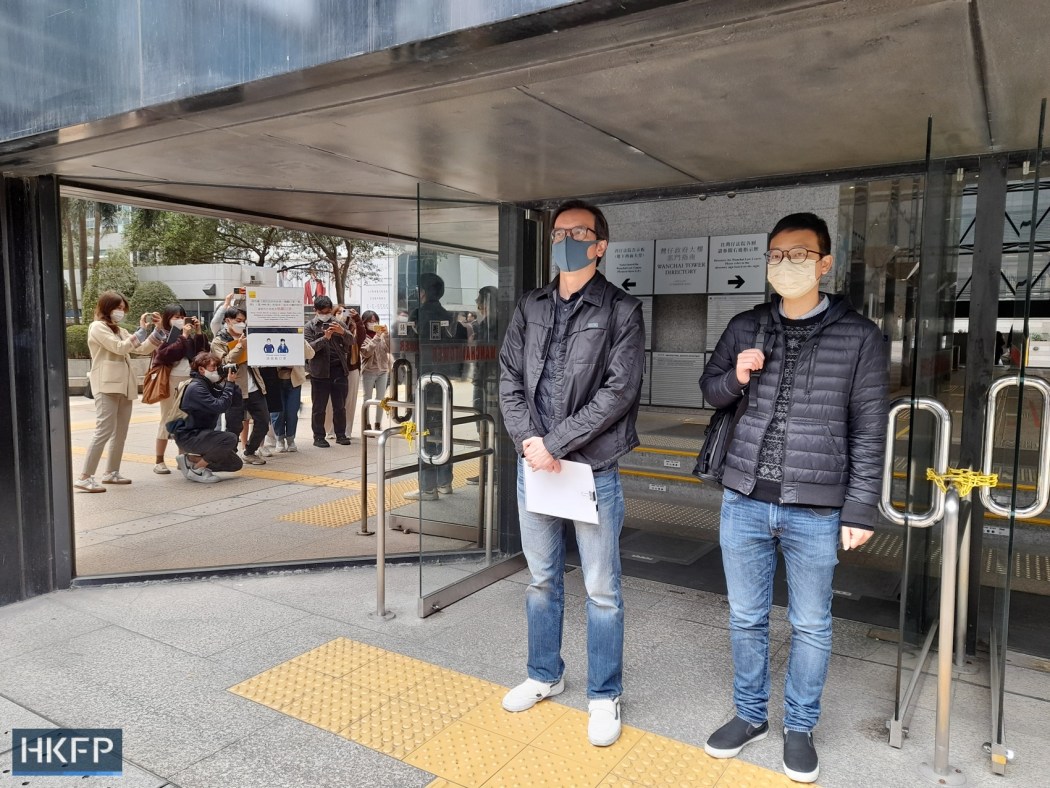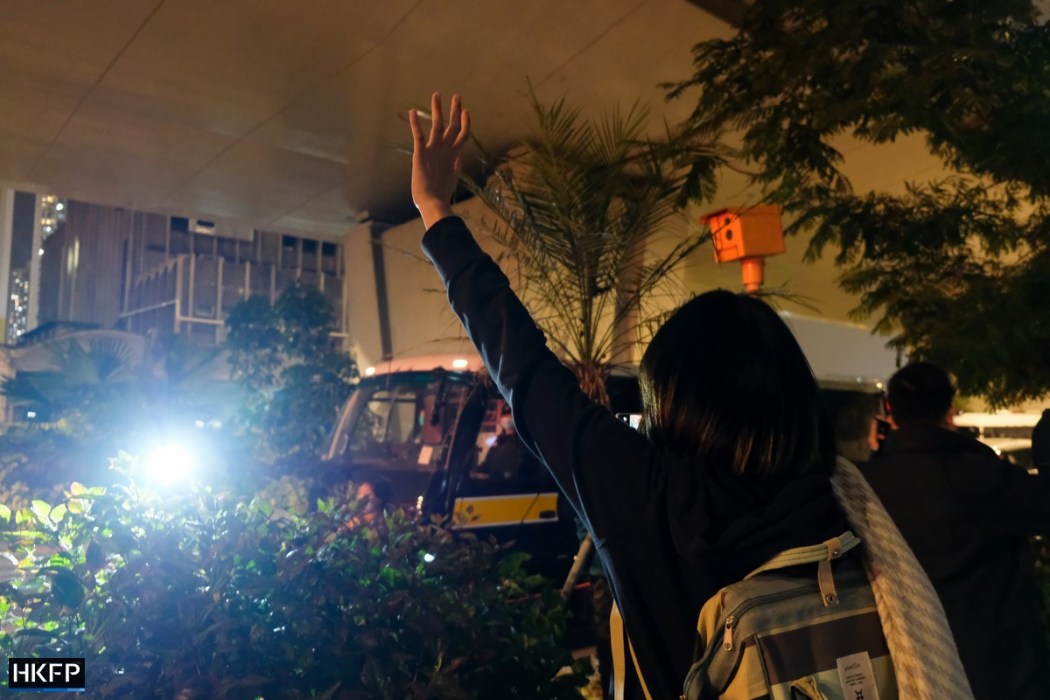Politicians should be allowed to criticise the local and national governments as part of Hong Kong’s commitment to free speech, according to an editor on trial for sedition – the first journalist in the city to face such a charge for decades.

Lead prosecutor Laura Ng continued her questioning of the former chief editor of Stand News Chung Pui-kuen in front of District Judge Kwok Wai-kin on Thursday, the 31st day of the trial.
Chung, along with the acting chief editor of the shuttered online not-for-profit outlet Patrick Lam, and Stand News’ parent company, are accused of conspiring to publish 17 “seditious” articles between July 2020 and December 2021.
On Thursday Ng asked Chung if the quotes in a profile story of Gwyneth Ho published in July 2020 were “seditious” and would “lead readers to hate the central authorities and dislike the Hong Kong government.”
Ho, a former Stand News reporter, quit her career as a journalist and became a candidate in the 2020 primary election organised by the pro-democracy camp. She is among the 16 democrats undergoing a separate trial under the Beijing-imposed national security law, for conspiracy to commit subversion in relation to the primary.
In the article, Ho was quoted as saying she would “use all means to contend with the Chinese Communist Party (CCP),” and called upon the public to “fight against the CCP.”
In response, Chung said he did not think Ho’s message was seditious since society had been accustomed to similar opinions “for a long period of time in the past.”

Citing how now-deceased Hong Kong novelist Ni Kuang was once allowed to say he “hates the CCP to death” on RTHK, Chung said more radical voices criticising the CCP had been heard in Hong Kong between 1997 and 2020.
Chung said his own understanding was that only speeches or comments which advocated immediate violent acts would constitute sedition. He believed Ho was only speaking of her political stance.
The ex-editor said “the government’s suppression of critical voices or opinions will cause hatred more easily” than such comments.
Chung said he did not examine whether the interview subject had a “seditious intention” when editing the profile.
“The space for free speech should permit the most fierce criticism and accusations, especially when the target is the authorities,” Chung said, adding that official wrongdoing could have the direst consequences.
Prosecutor Ng then told Chung the Basic Law and Hong Kong Bill of Rights said freedom of speech could be restricted for reasons such as national security or public order.
The former editor replied that he was the first journalist for decades to be charged under the sedition law. “I have never imagined [journalism] was bound by the sedition charge,” he said.
Owen Chow’s ‘subverting’ quotes
The lead prosecutor also questioned Chung over Stand News’ profile of Owen Chow, another democrat charged for his role in the 2020 primary. The interview was conducted after Chow was selected in the primary.
In the profile, Chow was asked if he was afraid of a possible life sentence as some considered the speech he gave during the primary as subversive.
The prosecution played videotapes of Chow at the primary’s election forums. The democrat said he took part in the poll to “promote the spirit of the Hong Kong nation,” and described One Country, Two Systems, the Basic Law and the Legislative Council as “China’s tool to colonise Hongkongers.”

Ng then asked Chung if Chow’s comments “objectively” constituted subversion.
The journalist answered that he thought only actions could lead to an offence of subversion under the national security law, “I don’t know how to judge if a speech can become [subversion.]”
Chung acknowledged that Chow’s choice of word was “radical,” but said his only material plan was to veto government bills and force the chief executive to dissolve the legislature and step down — a process authorised under the Basic Law.
“When it comes to means, he did not suggest using force or even armed violence,” the former chief editor said, “Vetoing the budget… at that time I didn’t think it was against the law. Many people understood that it was a right granted under the Basic Law as well.”
Chung added that he did not consider whether Chow’s speech was “seditious” before publishing his profile. The focus was on whether the reporting was in accordance with the facts.

“It doesn’t matter how radical were Chow’s speeches, I can even say I disagreed with some of them, we must not distort or censor but record 100 per cent of them,” Chung said.
He said it was “very important” to give a detailed account of Chow’s beliefs as he had beaten better-known politicians such as Leung Kwok-hung and Lam Cheuk-ting in the 2020 primary.
‘First draft of history‘
Chung was also asked about the outlet’s move to remove the opinion section as well as some news reports in June 2021, citing threats to its staff.
Ng asked Chung why the outlet later decided to put up Ho’s profile again after taking it down for a while. He said it was because he did not think there was anything wrong with the article.
“I believe that if Hong Kong truly upholds the space for free speech granted by the Basic Law and Bill of Rights, these articles are fine to publish,” he said.
The prosecutor then questioned whether Chung intended to test the government’s bottom line by keeping the story on the website. He denied the accusation and said they would not want to delete any articles “unless there was no choice.”

“I would not say they were very important. But all of them were my colleagues’ hard work, the historical records that they want to preserve,” Chung said.
“Some would say journalism is to provide the first draft of history. While it can be flawed, incomplete, or with potential mistakes… at least it provides a basis for future discussions. That, is our intention,” the journalist added.
Digital news outlet Stand News ceased operations and deleted its website in December 2021 after its newsroom was raided by over 200 national security police officers. Seven people connected to the independent outlet were arrested on suspicion of conspiring to “publish seditious publications.” However, only ex-chief editor Chung, acting chief editor Patrick Lam and parent company Best Pencil (Hong Kong) Limited were charged under the colonial-era sedition law.
Advocacy groups, the UN, and western countries criticised the arrests as a sign of declining media freedoms, whilst now-Chief Executive John Lee condemned “bad apples” who “polluted” press freedom following the raids.
Chung’s trial began in October 2022 with the court considering 17 allegedly seditious articles, including interviews, profiles, hard news reporting and opinion pieces. Sedition is not part of the Beijing-imposed security law and carries a maximum penalty of two years behind bars.
The trial continues.
